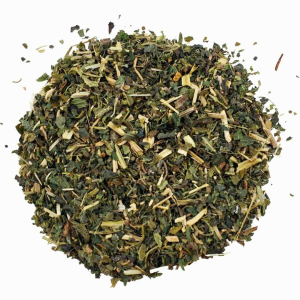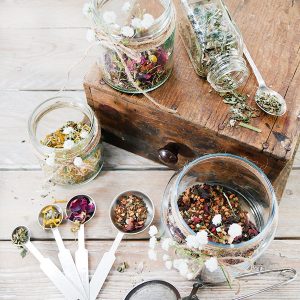The Importance of Herbal Remedies
Herbal remedies have been used for centuries to treat various ailments, including coughs. Our ancestors understood the healing power of nature and turned to herbs to alleviate their symptoms. In today’s chemical laden world, it’s important to remember the wisdom of the past and embrace the benefits of natural remedies.
When it comes to coughs, herbal remedies offer a safe and effective alternative to over-the-counter medications. Unlike synthetic drugs, herbs work gently with your body, addressing the root cause of the cough and strengthening your immune system. They can help soothe irritated throats, clear congestion, and support respiratory health. Plus, herbal remedies often come with fewer side effects.
In this blog post, I will share with you a herbal cough syrup recipe I use that can help alleviate the symptoms of a persistent cough. Whether you’re experiencing a dry, tickly cough or a wet, productive one, this syrup contains herbs that can address both states.
However, if you have a very wet cough and tend to be a generally damp person, I recommend exploring alternative remedies such as tinctures and hot teas instead.
Homemade Cough Syrups
If you don’t have access to all the herbs mentioned in this recipe, don’t worry! A classic cough syrup recipe can be made with just liquorice and thyme herbs. So, if you prefer a simpler approach, feel free to try that combination instead.
Sometimes, it can be challenging to find all the ingredients or herbs required for a recipe. But that shouldn’t stop you from trying out this natural remedy. By using just liquorice and thyme, you can still create a potent cough syrup that can help soothe your symptoms.
Remember, the goal is to find a solution that works for you. So, don’t hesitate to simplify the recipe and give it a try. Your health and well-being are worth it!
That being said, adding certain herbs like Plantain, thyme and mullein to the herbal cough syrup is an extra step in enhancing its effectiveness. Thyme is known for its antitussive properties, which can help soothe coughs and relieve congestion. Mullein, on the other hand, is a powerful expectorant that can help loosen phlegm and promote easier breathing.
By infusing these herbs into the syrup, you’re harnessing their natural healing properties and creating a potent remedy for your cough. So, take your time during this step to ensure that the herbs are properly infused, and you’ll be one step closer to a soothing and effective cough syrup.
Choosing the Right Sweetener

While I typically avoid using any sugar in my recipes, feel free to use it for your syrup. Using honey not only adds a touch of natural sweetness, it also provides additional health benefits. It’s worth noting that when using honey your syrup will not thicken as shop bought varieties so if this is important to you maybe consider a mixture of both.
Honey has antimicrobial properties that can help soothe a sore throat and reduce coughing. It also contains antioxidants that support the immune system.
So, if you prefer the healthier, more nutritious option, use raw local honey instead of sugar in this herbal cough syrup recipe. Your taste buds and your body will thank you!
Ingredients
To prepare this herbal cough syrup, gather the following ingredients:
25g of Plantain leaf
25g of Mullein leaf
5g of Thyme leaf
20g of Marshmallow root
20g of Licorice root
20g of Aniseed
(Optional extras: Cinnamon sticks, peppermint leaf or peppermint oil)
1 litre of water
Method
Begin by combining the licorice root, marshmallow root, & aniseed for decoction in a pot. Cover them with 1 litre of water and bring them to a boil. Let the mixture simmer gently for 20 minutes.
After 20 minutes, add the leaves to the pot, bring back to a boil & immediately switch off the heat. Allow to infuse for an additional 20-30 minutes.
Strain out the herbs and measure the liquid obtained.
Add half or an equal amount of honey & Mix well. If you prefer a less sweet syrup, start with half the jar and taste test as you pour the rest in – FYI using a little more or less won’t ruin your syrups medicinal quality!!
When using honey your syrup will not thicken as shop bought varieties because you do not boil with sugar or add thickening agent. Raw honey is antibacterial, antiviral and antifungal. it contains all kinds of goodness – pollen, vitamins, minerals, trace enzymes, amino acids, phytonutrients and other beneficial health boosting elements. If you heat raw honey you will kill these beneficial enzymes within it.
If using sugar, return the strained liquid to the pot along with an equal quantity in grams of soft dark brown sugar. Example; if you have 800 ml liquid you will need to add 800g sugar and so on.
Return to a simmer, stirring continually then remove from the heat and stir as it cools and thickens.
Now that you have prepared the herbal cough syrup, it’s time to move on to the next step: bottling the syrup.
Storage & Dosage Instructions
It’s best to keep the syrup in lidded glass jars or bottles. Glass won’t leach harmful
chemicals or microplastics into the syrup. I use old ketchup bottles, kilner jars, medicine bottles etc.
Homemade syrup needs to be kept in the fridge or you can also freeze in ice cube
trays and defrost as needed.
When stored in an airtight container in the fridge, your syrup will stay fresh for
about 2 months. if left untouched for any longer mold may start to form so always
check it if you haven’t been using it.
RECOMMENDED DOSE: 1 tablespoon as needed up to 8 times a day. For children
under 12: 1 teaspoon and younger children up to 6: a half teaspoon.
It’s As Easy As That!
This homemade herbal cough syrup not only provides relief from coughs but also tastes really good. By opting for a homemade herbal cough syrup, you are choosing a natural alternative to over-the-counter medications that often come with unwanted side effects.
The combination of herbs in this recipe have been carefully selected for their soothing and healing properties, making it a safe and effective remedy for both dry and wet coughs.
All of the ingredients can be found in our herb shop and to make it even easier to get started, I have created a handy Home Remedy kit containing all the ingredients you need to make this yourself without having to weigh anything out, including the raw Irish honey.
Remember, nature has provided us with an abundance of healing plants, and harnessing their power can lead to improved well-being. So, why not give this herbal cough syrup a try and experience the benefits for yourself? Wishing you all good health!




 Hi, I’m Róisín Sheridan, founder and creator of HealthTea. My 3 main passions in life are people, nature and health, although not always in that order...
Hi, I’m Róisín Sheridan, founder and creator of HealthTea. My 3 main passions in life are people, nature and health, although not always in that order... 



